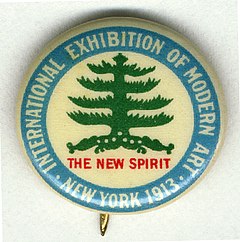Armory Show of 1913

Armory show button, 1913, from the Archives of American Art
|
|
| Date | February 17, 1913 to March 15, 1913 |
|---|---|
| Location | 69th Regiment Armory, New York, NY |
| Also known as | The International Exhibition of Modern Art |
| Participants | Artists in the Armory Show |
|
|
Among the many exhibitions that have been held in the vast spaces of U.S. National Guard armories, the Armory Show typically refers to the International Exhibition of Modern Art that was organized by the Association of American Painters and Sculptors in 1913, the first large exhibition of modern art in America.
The three-city exhibition started in New York City's 69th Regiment Armory, on Lexington Avenue between 25th and 26th Streets, from February 17 until March 15, 1913. The exhibition went on to show at the Art Institute of Chicago and then to The Copley Society of Art in Boston, where, due to a lack of space, all the work by American artists was removed.
The show became an important event in the history of American art, introducing astonished Americans, who were accustomed to realistic art, to the experimental styles of the European avant garde, including Fauvism, Cubism, and Futurism. The show served as a catalyst for American artists, who became more independent and created their own "artistic language."
"The origins of the show lie in the emergence of progressive groups and independent exhibitions in the early 20th century (with significant French precedents), which challenged the aesthetic ideals, exclusionary policies, and authority of the National Academy of Design, while expanding exhibition and sales opportunities, enhancing public knowledge, and enlarging audiences for contemporary art."
On December 14, 1911 an early meeting of what would become the Association of American Painters and Sculptors (AAPS) was organized at Madison Gallery in New York. Four artists met to discuss the contemporary art scene in the United States, and the possibilities of organizing exhibitions of progressive artworks by living American and foreign artists, favoring works ignored or rejected by current exhibitions. The meeting included Henry Fitch Taylor, Jerome Myers, Elmer Livingston MacRae and Walt Kuhn.
...
Wikipedia
